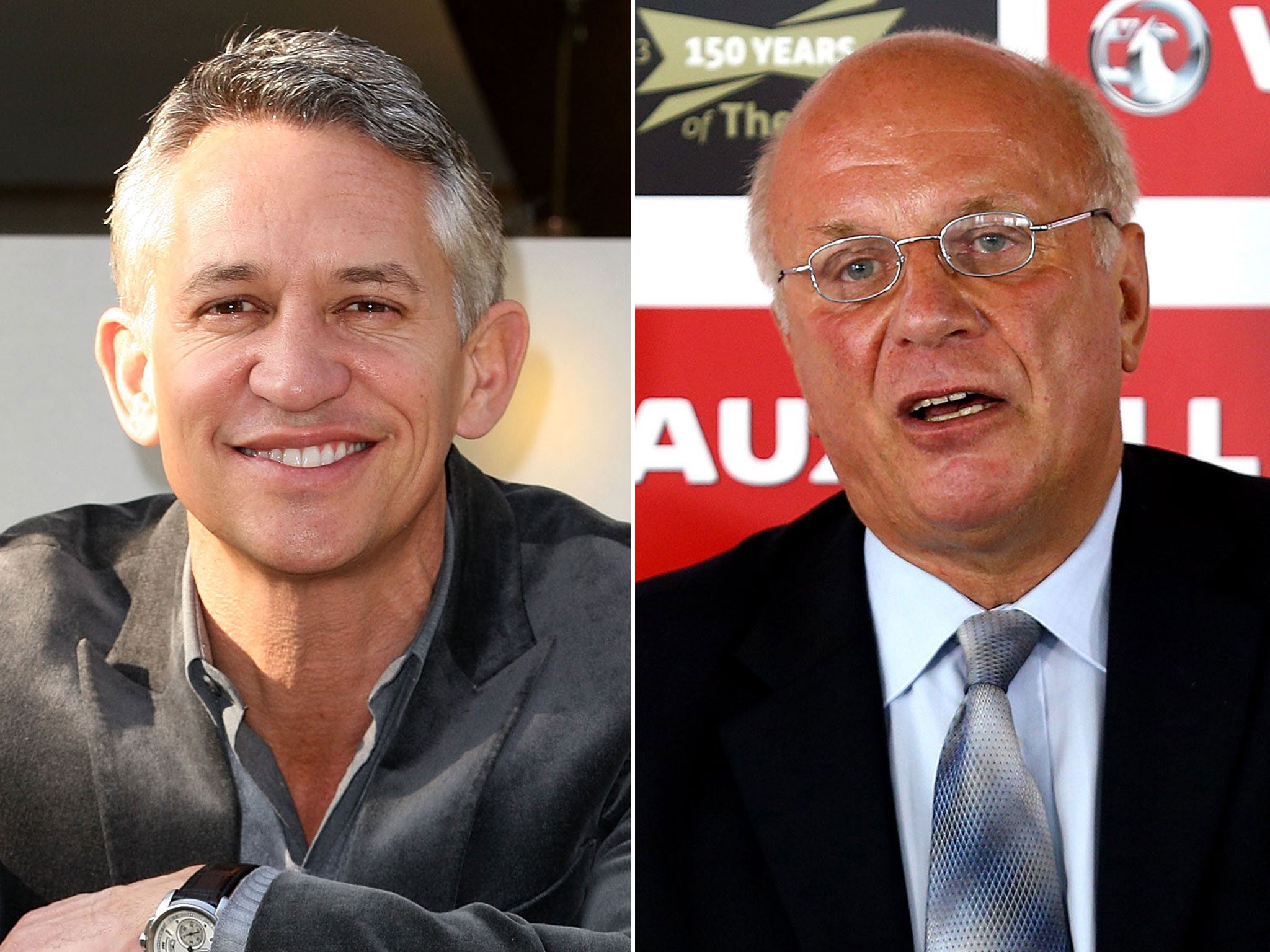Gary Lineker rejects Greg Dyke's FA panel as 'pointless... a missed chance'
Much-hyped commission attacked for uninspiring selections while Campbell criticises lack of ethnic minorities involved

Your support helps us to tell the story
From reproductive rights to climate change to Big Tech, The Independent is on the ground when the story is developing. Whether it's investigating the financials of Elon Musk's pro-Trump PAC or producing our latest documentary, 'The A Word', which shines a light on the American women fighting for reproductive rights, we know how important it is to parse out the facts from the messaging.
At such a critical moment in US history, we need reporters on the ground. Your donation allows us to keep sending journalists to speak to both sides of the story.
The Independent is trusted by Americans across the entire political spectrum. And unlike many other quality news outlets, we choose not to lock Americans out of our reporting and analysis with paywalls. We believe quality journalism should be available to everyone, paid for by those who can afford it.
Your support makes all the difference.It is barely out of the wrapper but the make-up of Greg Dyke’s Football Association commission charged with finding much-needed ways to revive the national side has already been dismissed as “utterly pointless” by Gary Lineker, fast becoming a prominent thorn in the FA’s side.
The seven men invited by Dyke to join him around a Wembley table, with a possible further two to come, have yet to sit down to the Herculean task of reinventing English football before the composition of the group has been attacked by a growing number of critics. Sol Campbell yesterday joined Lineker in questioning those so far selected by Dyke.
The new chairman of the FA announced last month the creation of a commission to examine the pressing need to ensure more young English players feature in the Premier League as well as a wider root-and-branch reform of the game’s structure and coaching. On Wednesday, he revealed the names of those chosen to come up with “something concrete” by March. It was a list that left many underwhelmed.
Yesterday, hours before last night’s key World Cup qualifier against Montenegro, Lineker tweeted: “No wonder they announced Glenn Hoddle early on FA commission. Most of the others are utterly pointless. Expected better from Greg Dyke.”
Asked whether he thought the list was too heavy on footballing “bureaucrats”, the former England captain replied: “Exactly!” Lineker also described it as a “real missed opportunity”. Last month Lineker was critical of England’s “awful” plodding performance in a goalless draw against Ukraine in Kiev.
Campbell, meanwhile, was unimpressed with the ethnic mix, or rather lack of it, among the names so far declared on the commission. “I wouldn’t mind if they had some black players in there, black players who have actually done something for club and country,” said Campbell.
The seven chosen to join Dyke are Howard Wilkinson, representing the League Managers’ Association, Ritchie Humphreys, the Chesterfield defender, representing the players’ union, Greg Clarke, chairman of the Football League, Dario Gradi, director of football at Crewe Alexandra, former England manager Hoddle, Roger Burden, an FA vice-chairman, and former England and Leeds full-back Danny Mills.
The FA is talking to a number of other candidates including, it is believed, some from a variety of ethnic backgrounds, to fill the remaining places. Dyke wants no more than 10 in total, but others may be asked to contribute in different ways. The Premier League will not have a representative on the commission, having turned down an invitation.
There remains a worrying vagueness to the entire process, with neither the terms of reference nor the goals of the commission having been clearly established. For such a “big idea”, unfurled in state-of-the-nation fashion, the next steps appear to have lacked a clear sense of direction. It has not been an encouraging start.
There will, though, be a diverse range of views among the commission. Mills yesterday disagreed with Dyke’s suggestion that England should remain open to looking to find ways to include the likes of the Belgium-born Manchester United teenager Adnan Januzaj, who could qualify through residency in due course – and if he wants to play for England ahead of the country of his birth or Albania, the native country of his parents.
Mills said turning to Januzaj would offer only a “quick fix to a long-term problem”. He added: “If you start to do that, you actually detract from encouraging English clubs to go and find young English players. If you carry on going through where we are, in another 10 or 15 years England will struggle to qualify because there won’t be enough players.”
Whatever the merits of the men Dyke has appointed, he has at least started a debate. Yesterday the Everton chief executive, Robert Elstone, wrote an extensive blog in defence of the Premier League, outlining what the top flight has brought to the English game and appearing to criticise the FA for its sustained inability to deal with failings in the sport at grass-roots level.
Elstone wrote: “I am certain those in the game know which organisation has transformed the fortunes of English football, has put our game back on the map, has put respectability back into our game. The world’s most admired, envied and respected league is ours – and it’s not just about the money.
“The Premier League has created the perfect environment to develop world-class players, a research and development laboratory with maximum stress-testing and the potential for true Darwinian outcomes. How many great players do we actually need to win a World Cup? The Belgians might do it with 15. Maybe it’s time to think quality and not quantity?”
Join our commenting forum
Join thought-provoking conversations, follow other Independent readers and see their replies
Comments